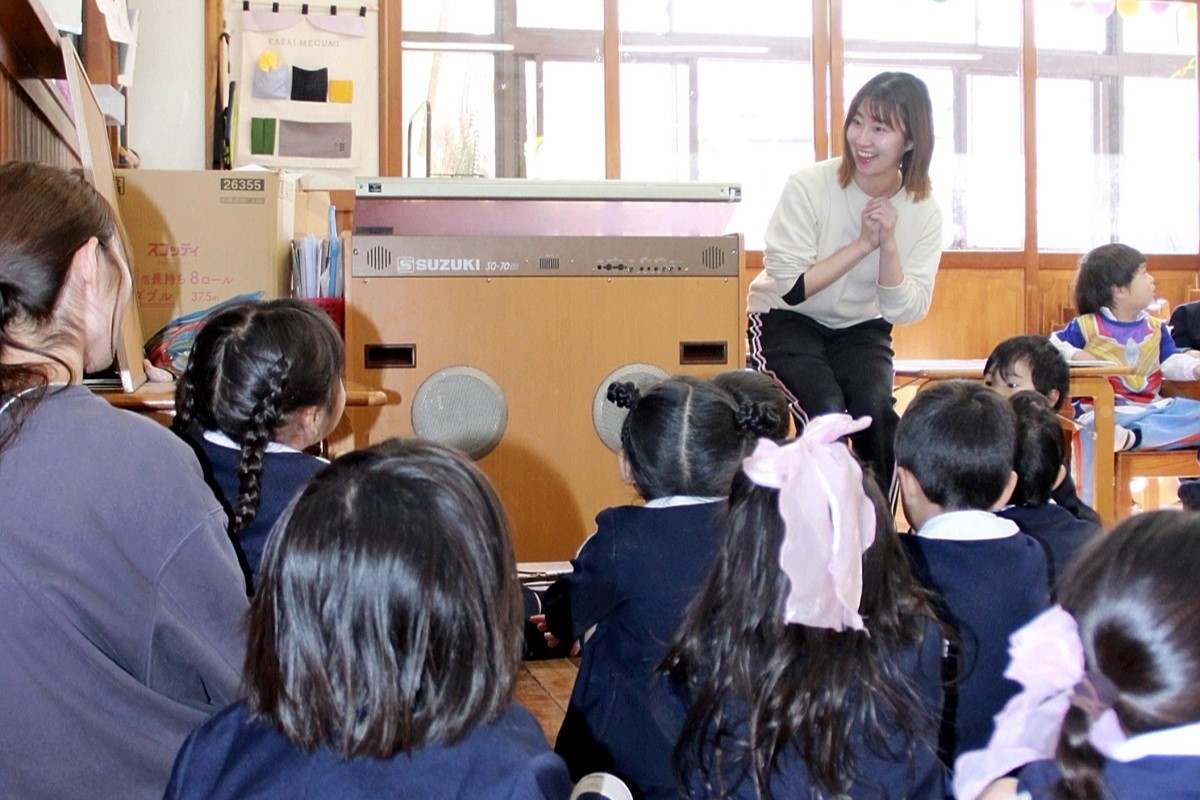Parenthood Seen as Daunting Burden by Young People; Paternity Leave Underused; Cost of Education a Hurdle

Children attend a class at a certified childcare center in Edogawa Ward, Tokyo.
21:00 JST, February 28, 2024
Despite the government’s efforts to support child-rearing, it has yet to alleviate the sense of burden that young Japanese feel about marriage and childbearing.
The number of babies born in the country in 2023 fell to a record low of 758,631.
The government must establish a system to support all generations who wish to have children.
Short paternity leave
“The burden of childcare is too heavy on the mother. I want to have a second child, but I think it will be difficult to do so in the current situation,” said a 34-year-old company employee who is the mother of a 1-year-old daughter.
Her husband, also 34, comes home late from work, leaving her to do housework and childcare on weekdays.
She plans to return to work in May after taking childcare leave, but she is worried about balancing work and childcare.
“I’m physically and emotionally exhausted. It’s hard to even think about going back to work,” she said.
The number of children on nursery school waiting lists has dropped to about a tenth of its peak in 2017, as an increasing number of childcare facilities have been established nationwide.
The percentage of male employees taking paternity leave also increased to about 17% in fiscal 2022, due to the expansion of the childcare leave program.
Yet, 50% of men who took childcare leave did so for a short period of time — less than 2 weeks. Given this, there is still a long way to go before “working together and raising children together,” in which burdens are fully shared by both spouses, becomes a reality.
According to a 2021 survey by the Health, Labor and Welfare Ministry, about 89% of families in which the husband spends six or more hours daily on his days off doing housework and childcare have had a second or subsequent child.
The government must further promote support for balancing work and childcare, including reviewing work styles.
“Parents are feeling an increasing sense of burden after the shift toward nuclear families and other factors,” said Kana Takeda, a consultant at Nomura Research Institute Ltd. “It will be important for society as a whole to create an environment in which households raising children can feel free to consult a third party.”
Raising study expenses
The number of marriages in 2023 was down by more than 30,000 from the previous year, which is likely to affect the number of births in the future.
“A surprisingly large amount of money is taken out of my paycheck for social security contributions and taxes. I wonder if I will be able to have a family in the future,” said a 25-year-old woman working full-time at a nursing home in Tokyo.
She lives in the company dormitory to save on housing costs and cooks her own meals. Her after-tax monthly income is about ¥200,000. She said she would like to get married and have two or three children in the future, but that is not realistic in light of her current unaffordable lifestyle.
According to a 2023 survey by Recruit Bridal Research, 42.5% of men and 27.7% of women said that they did not want to get married because they would not be able to afford it financially.
Annual salaries for people in their early 30s averaged ¥4.25 million in 2022, up just 1.4%, or ¥60,000, from 20 years ago.
Meanwhile, the average cost of education for one child was ¥5.74 million for public school from kindergarten through high school and ¥18.38 million for private school, both record highs, according to a survey conducted by the Education, Culture, Sports, Science and Technology Ministry for fiscal 2021.
In the same survey, the top responses regarding marriage included, “Marriage limits behavior and lifestyle” and “Marriage does not seem to bring any benefits.”
Housing and food costs also began to rank high on the list of responses, indicating that people are being forced to be cautious about marriage.
Negative spiral
The number of births in 2023 was about 3,000 below the most recent estimate from the National Institute of Population and Social Security Research.
The estimate assumed that the number of births would bottom out by 2023 and begin to rise in 2024 as the impact of the COVID-19 pandemic waned. However, the future outlook remains unclear.
The current declining birthrate will result in there being fewer people in the generations who will become parents 20 to 40 years from now, setting the stage for further birthrate declines in the future.
The social safety net — including pensions, health care and long-term care services, and child care assistance — will become fragile if the number of people who can support the social security system declines.
The negative spiral of declining birthrates will affect the lives of all generations.
“All generations should share the burden of financing measures for the declining birthrate fairly, according to their ability to bear the burden,” Kazuhiko Nishizawa, a counselor at the Japan Research Institute Ltd. said.
Top Articles in Society
-

JAL, ANA Cancel Flights During 3-day Holiday Weekend due to Blizzard
-

Man Infected with Measles May Have Come in Contact with Many People in Tokyo, Went to Store, Restaurant Around When Symptoms Emerged
-

Australian Woman Dies After Mishap on Ski Lift in Nagano Prefecture
-

Foreign Snowboarder in Serious Condition After Hanging in Midair from Chairlift in Nagano Prefecture
-

Record-Breaking Snow Cripples Public Transport in Hokkaido; 7,000 People Stay Overnight at New Chitose Airport
JN ACCESS RANKING
-

Univ. in Japan, Tokyo-Based Startup to Develop Satellite for Disaster Prevention Measures, Bears
-

JAL, ANA Cancel Flights During 3-day Holiday Weekend due to Blizzard
-

Japan Institute to Use Domestic Commercial Optical Lattice Clock to Set Japan Standard Time
-

China Eyes Rare Earth Foothold in Malaysia to Maintain Dominance, Counter Japan, U.S.
-

Japan, Qatar Ministers Agree on Need for Stable Energy Supplies; Motegi, Qatari Prime Minister Al-Thani Affirm Commitment to Cooperation

















